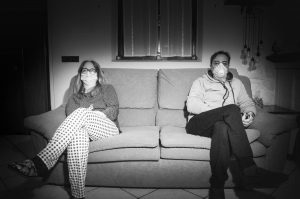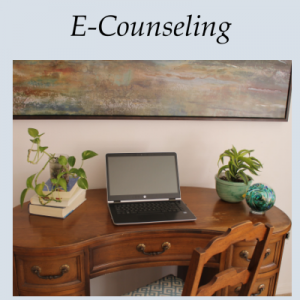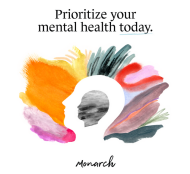Kristine Proctor
Self Regulation Introduction
 In dealing with the pandemic and the plethora of problems it has brought into people’s lives over this past year, many have recognized the necessity of intentionality in the area of mental health. This new, or renewed, curiosity about how to keep oneself healthy in the face of experiencing such a variety of disruptive events, has elicited many varying responses. These high levels of emotional bombardment and our responses can often generate additional anxiety and stress, and in some instances can lead to higher incidences of depression. The ability to cope with many of these things has a relationship with something called self-regulation, which is the ability to manage one’s emotions, behavior and body movement when faced with difficult situations.
In dealing with the pandemic and the plethora of problems it has brought into people’s lives over this past year, many have recognized the necessity of intentionality in the area of mental health. This new, or renewed, curiosity about how to keep oneself healthy in the face of experiencing such a variety of disruptive events, has elicited many varying responses. These high levels of emotional bombardment and our responses can often generate additional anxiety and stress, and in some instances can lead to higher incidences of depression. The ability to cope with many of these things has a relationship with something called self-regulation, which is the ability to manage one’s emotions, behavior and body movement when faced with difficult situations.
When attempting to understand this phenomenon, it is not uncommon to confuse “self-control” with “self-regulation.” Self-control is the ability to keep emotions and impulses in check, both when alone and in social situations. Many of our current situational responses to mask-wearing for example, have to do with self-control, whereas the fears or anxiety one may feel about the pandemic has more to do with self-regulation. However, both are skills that can be developed over time.
In my practice, I have found that many clients struggle with self-regulation, not knowing what it is or how to help themselves. These struggles often lead to greater difficulties in responding emotionally in certain situations where one might find conflict between the ability to self-regulate and self-control. This mismatch often increases stress and anxiety, has implications with anger management, and communication with others. It can cause despair and depression, relationship difficulties, or in extreme cases even violence or abuse.
In learning to practice better self-regulation, one might improve self-esteem and self-confidence, as well as find an overall reduction in some of the symptoms related to the distress and psychological turmoil they may be feeling.
Below is an article by my colleague, which explores the potential for improving our self-regulation. Several followup articles will explore the concept further, sharing examples of what self regulation really is and how to improve it through techniques such as mindfulness-based interventions, cognitive reframing (changing thoughts), and other emotional regulation strategies.
Find yourself, and be that!

Licensed Clinical Social Worker
EMDR Certified Therapist
112 W. New York Avenue, Suite 205
DeLand, FL 32720
Introduction to Self-Regulation of Youth and Adolescence
By Joel A. Bennett, M.Ed.
 “Why can’t you control your meltdowns?” “Why is it so hard to focus on what you are working on?” “Why do your emotions swing so far so fast?” As a parent and educator, with 15 years in both the classroom and the home, I have heard these questions and others like them from many other parents, as well as pondered them myself. Is it only anecdotal stories that make me think that Americans are decreasing in their ability to control themselves, their emotions, their responses? Psychology has developed the umbrella idea of self-regulation which encompasses our ability to self-monitor, –evaluate, –react, –judge. It includes focusing and maintaining attention as well as physiologically controlling our stress response (Cellar et al, 2011, Blair and Raver, 2015, Pandey et al, 2018).
“Why can’t you control your meltdowns?” “Why is it so hard to focus on what you are working on?” “Why do your emotions swing so far so fast?” As a parent and educator, with 15 years in both the classroom and the home, I have heard these questions and others like them from many other parents, as well as pondered them myself. Is it only anecdotal stories that make me think that Americans are decreasing in their ability to control themselves, their emotions, their responses? Psychology has developed the umbrella idea of self-regulation which encompasses our ability to self-monitor, –evaluate, –react, –judge. It includes focusing and maintaining attention as well as physiologically controlling our stress response (Cellar et al, 2011, Blair and Raver, 2015, Pandey et al, 2018).
Wow! That sounds exactly like the types of problems parents and my colleagues have been noticing! Because my personal and professional observations align with these observations, I wondered, “If this umbrella idea of self-regulation has been identified, is there evidence on how to improve these abilities?” I looked at 18 peer-reviewed articles focused on youth and adolescence (2-18-year-olds) and found clear demonstration that, YES, SELF-REGULATION CAN BE IMPROVED!
A very helpful way of looking at improving self-regulation is to break the problem into two realms of focus: biological and cognitive (Cole, Ram, & English, 2019). Think of this scenario: You are walking from your room for your morning coffee when you step on your child’s cars that were left in the hallway. You went to bed late, woke up with a tremendous agenda that may or may not get finished before you must run your kids to appointments. You are not biologically at your peak. Maybe not even in your top 75%. If you have had a moment like the one I just described, you may recall responding in a way you were regretful about later. I know I have asked for forgiveness after moments like this. Cole, Ram, and English (2019) lump exhaustion, hunger, lack of rejuvenation, and the like into the biological realm.
Our children find themselves in this predicament many times, too. Many parents instinctively pack snacks, create routines for sleeping, exercise, fresh air, and quiet time into the day-to-day rhythm. Galla and Duckworth (2015) found that building beneficial habits provides the strongest positive life outcomes. A quick snack or regular waking and sleeping schedule may address an individual’s ability to control impulses, maintain focus or self-awareness and become the least costly solution to improved self-regulation.
The second realm to consider when looking at ways to improve self-regulation is the cognitive. Do we have the neurological pathways to respond, to control, to become aware of ourselves? These neuropathways are developed in the context of our relationships rather than individually. It has been demonstrated that high doses of parent-child “attunement,” a neurologically synchronized give and take, co-creation experience, have significant impact in the youth who experienced the ongoing activities with the parents (Davis, Bilms, & Suveg, 2017). Another give and take role playing model was found in the Tools of the Mind preschool and Kindergarten curriculum. This curriculum utilizes mature, dramatic play to improve executive function (Diamond, Barnett, Thomas, & Munro, 2007). It ought not to be a surprise that traditions from the past that have been cast aside, such as family dinners where people look at one another and engage in the give and take of creating a space or Holy Days with traditions and engagement or walks in nature, were more valuable than we previously thought. These former traditions provided regular and routine opportunities to attune to our loved ones and invest in their neurological abilities to self-regulate!
And while it is true that past traumas of rejection, attachment issues and disorders, or harms play a strong role in self-regulation, we can make progress and strengthen the positive alternatives to dysregulation by considering the push and pull relationship between the biological and the cognitive.
Blair, C., & Raver, C. C. (2015). School Readiness and Self-Regulation: A Developmental Psychobiological Approach. Annual Review of Psychology, 66, 711-731.
Cellar, D., Stuhlmacher, A., Young, S., Fisher, D., Adair, C., Haynes, S., …Riester, D. (2011). Trait Goal Orientation, Self-regulation, and Performance: A Meta-Analysis. Journal of Business and Psychology, 26(4), 467-483. https://doi-org.wgu.idm.oclc.org/10.1007/s10869-010-9201-6
Cole, P.M., Ram, N., & English, M.S. (2019). Toward a Unifying Model of Self-regulation: A Developmental Approach. Child Development Perspectives, 13(2), 91-96. https://doi-org.wgu.idm.oclc.org/10.1007/s10802-010-9418-x
Davis, M., Bilms, J., & Suveg, C. (2017). In Sync and in Control: A Meta-Analysis of Parent-Child Positive Behavioral Synchrony and Youth Self-Regulation. Family Proces, 56(4), 962-980. https://doi-org.wgu.idm.oclc.org/10.1111/famp.12259
Diamond, A., Barnett, W.S., Thomas, J., & Munro, S. (2007). Preschool Program Improves Cognitive Control. Science, November 30; 318(5855): 1387-1388.
Galla, B. M., & Duckworth, A. L. (2015). More than resisting temptation: Beneficial habits mediate the relationship between self-control and positive life outcomes. Journal of Personality and Social Psychology. 109(3), 508-525. Doi:10.1037/pspp0000026
Pandey, A., Hale, D., Das, S., Goddings, A. L., Blakemore, S. J., & Viner, R. M., (2018). Effectiveness of Universal Self-regulation – Based Interventions in Children and Adolescents: A Systematic Review and Meta-analysis. JAMA Pediatrics, 172(6), 566-575. https://doi-org.wgu.idm.oclc.org/10.1001/jamadediatrics.2018.0232
New Location in downtown DeLand, Florida!
I am excited to share that the counseling office has moved! The office is still located in beautiful, historic downtown DeLand, although now it is in The Conrad. It is between The Beacon Newspaper and Artisan Alley, and across the street from Chess Park with its relaxing fountain feature, massive, aged oak trees and shaded benches. It is less than half a mile from Stetson University.

To schedule an initial consultation or evaluation, to make an appointment or to obtain additional information about any of the counseling services available, please call me directly at 321-280-9120 or send me an email.

A map showing the location can be found here. Sessions are available in person, as well as online through a HIPPA-compliant, encrypted platform. As a licensed therapist in the states of Florida and Michigan, the option of online counseling is available to anyone living in either state. Reach out to discover whether face-to-face or online is the best fit for you and your journey.
I look forward to sharing this new space with you.
Find yourself, and be that!

Licensed Clinical Social Worker
EMDR Certified Therapist
112 W. New York Avenue, Suite 205
DeLand, FL 32720
Suicide Prevention: What Can You Do? Kristine Proctor, MSW, LCSW
Suicide Prevention: What Can You Do?
Kristine Proctor, MSW, LCSW
Suicide is a difficult topic. Many of us would like to believe that we will not ever have the need to deal with this reality but unfortunately, at some point in our lives we may have to either for a friend, family member, coworker or for ourselves.
There are many misconceptions about those who have suicidal ideation and how friends or family can be supportive. It is important to understand as much as you can about how you can help a family member or friend, or when you might need to reach out for help for yourself.
Knowing what to look for is a good place to start. According to the CDC, there are 12 warning signs to look for:
Feeling like a burden
Being isolated
Increased anxiety
Feeling trapped or in unbearable pain
Increased substance use
Looking for a way to access lethal means
Increased anger or rage
Extreme mood swings
Expressing hopelessness
Sleeping too little or too much
Talking or posting about wanting to die
Making plans for suicide
So then, how can you respond if you have concerns? Here are a few ideas to help:
Ask directly if they are thinking about suicide. You might say, “Have you ever felt/Do you feel so bad that you’ve thought about suicide?” It’s okay to talk about it. Research shows that by asking you are not “putting the thought in their head” and that inquiring about suicidal thoughts does not prompt suicidal thoughts. Remember, if you don’t ask, you may not know. Additionally, just because someone is thinking about suicide does not mean they have a plan, the actual intent or the means to follow through. Asking directly helps you understand what their current thoughts and feelings are and helps you know how to respond.
Listen to their answers. Many times the way someone talks about their thoughts of suicide are indirect. Or a hint might be said in a joking manner. Don’t assume they are joking. Pay attention to statements like, “I just want to curl up in a ball and die.” Or “I just want to sleep and never wake up.” Or “I’ve got no reason to live.” These statements alone do not necessarily indicate that someone is suicidal but could be a clue taken in the larger context of their behavior and moods.
Make sure they are safe. Ask them about whether or not they have the means to follow through on a plan that they’ve discussed. Removal of weapons, medications or drugs and even access to their car can help ensure safety.
Don’t keep secrets. While it may be difficult to reach out for help, safety is essential. Let them know you’ll help with a plan to get them the mental health support they need. You will be able to deal with the fallout of a friend or family member’s frustration at some point later, after knowing they have the help they need.
Encourage them to get help from a professional. Unless you are a mental health professional, it is best to encourage or even facilitate getting help. In case of emergency, immediately call 911. The National Suicide Lifeline 1-800-273-8255 can be called 24/7 for one to consult a medical professional for advice. It is a confidential resource. For those hard of hearing, you can chat with a Lifeline counselor via suicidepreventionlifeline.org.
If you would like to find out more about how you can recognize a crisis and the warning signs that someone might be contemplating suicide, an excellent resource is The QPR Institute (Question, Persuade, Refer) at QPRInstitute.com. Many health departments and school districts offer free training opportunities.
Kristine has many years of experience working with individuals feeling sad, depressed and anxious. Feel free to reach out to her if you believe counseling is needed for you or someone you care about. Kristine offers two appointment options: a) face-to-face in her downtown DeLand, Florida office or b) via an online, HIPAA compliant video chat. Online therapy is not the best option for everyone. Some issues are best addressed face-to-face.
If you are in crisis, call the National Suicide Prevention Lifeline, a free, 24-hour hotline at 1.800.273.8255. If your issue is an emergency, call 911 or go to your nearest emergency room. Kristine Proctor, MSW, LCSW, LLC does not offer crisis counseling or emergency services.
Reach out to discover the best fit for you and your journey. Wishing you peace and courage.
Find yourself, and be that!

Licensed Clinical Social Worker
EMDR Certified Therapist
112 W. New York Avenue, Suite 205
DeLand, FL 32720
How Well Do You Bounce? Part 4: Taking Care of You Kristine Proctor, MSW, LCSW
How Well Do You Bounce?
Part 4: Taking Care of You
Kristine Proctor, MSW, LCSW
Carl Jung said, “The privilege of a lifetime is to become who you really are.”
With developing resilience being our goal in our past few blogs, we’ve been intentionally tuning in to our mental and emotional processes to identify our stressors, adapt a growth mindset and get to know our true selves better.
Now you’ll want to take continuous advantage of the “privilege of a lifetime” Jung referred to. In order to do that, you’ll need to create a plan to follow. This will ensure that you maintain this priority. Your plan can be like a budget in the sense that it is a goal, your ideal. Know that at times it will need to be altered based on your circumstances and current emotional state. And now that you’ve got more information about how you tick and what you need, it will be easier to create a plan that is realistic and one that really fits you.
Using the following as a guide, think of some things you’ll want to include in your self-care plan:
What does my body need?
What does my mind need?
What does my spirit need?
What do I want to accomplish?
What are some potential obstacles?
Who are the supportive people in my life?
The plan should be recorded but use any format that works for you. You might make a word document, write your plan in a journal, use a calendar and pencil in specifics, or draw a diagram that includes your priorities.
Next, find a visible place for your plan so that it will be convenient to review on a regular basis. Your self-care plan is an affirmation of you. Research shows many of us spend lots of time setting priorities and goals and making strategic plans in our work lives but then fail to follow through and just let our personal lives unfold. Why not spend some valuable time investing in yourself? I guarantee the reward will be worth it!
Find yourself, and be that!

How Well Do You Bounce? Part 3: Know Yourself Kristine Proctor, MSW, LCSW
How Well Do You Bounce?
Part 3: Know Yourself
Kristine Proctor, MSW, LCSW
One of the ways to increase our coping capacity is to develop our resilience, defined as the ability to recover quickly from difficulty. In part 1 and 2 of this series, we looked at characteristics of individuals who have the ability to bounce back from adversity in order to give ourselves a benchmark for our own level of resilience. We asked ourselves, “How well do I bounce?”
In addition to adapting a growth mindset (see part 2), there are additional strengths we can develop or improve to be more resilient. Essential to our ability to grow is our self-knowledge. Of course, we already know a lot about ourselves! In this instance, I am talking about getting to know your true self by thinking about some of the deeper aspects of your inner being that are not often part of your day to day thinking.
For example, ask yourself a series of questions such as these to help you understand what you believe and how it is influencing your life choices.
What is my belief about myself in this situation? What is my behavior? And what is the outcome of those? How is it helping me? What is this belief costing me? How can I change the belief to increase benefits & reduce costs? What are the triggers? What thinking trap is being coupled with the belief?
As part of this assessment, you may have identified some patterns you’d like to be different. This is the first step, as you can’t change what hasn’t been acknowledged. Remember, tracking your thoughts and behavior and observing with compassion is the lens you’re using. Remind yourself that change takes time and that your greatest goal is to know yourself better, not to find faults and beat yourself up. Start small and work on one issue at a time so as to keep from becoming overwhelmed. Apply that growth mindset you’ve been adapting from part 2 of this series.
A third helpful step is to assess how vulnerable you are to stress. This can be accomplished by taking a step back and looking at how full your life is currently and whether or not what you spend your time on fits with your true priorities. What are the major stressors in your life right now? What can be controlled about each of them?
If you recognize there are factors outside your control, you can choose to recognize your ability to choose your response to those things. Challenge the negative thoughts and put things in perspective.
One way you can accomplish this is to: a) Acknowledge the negative thought, b) Tell yourself to “Stop that thought.” and c) Replace it with a positive thought. Then, d) Repeat as often as needed.
Another option is to practice reframing your challenges as opportunities. For example, instead of a response of “Not THIS again!” you can reframe it as “I’ve done this before. I’ll be done in no time.” Or shift your naming of a task from “have to” to “get to.” Believe it or not, your brain doesn’t know you don’t fully mean it and will respond in a more positive, adaptive manner. And over time you’ll start to recognize a true shift in your perspective, as well.
Here’s wishing you much courage and fulfillment as you continue your journey to knowing your true self better.
Find yourself, and be that!

How to Help Your Marriage Survive Lockdown

How to Help Your Marriage Survive Lockdown
Relationship experts share advice on how to survive “intensive togetherness.”
Dinner at home was not on the menu when Jennifer Monahan planned her 10th wedding anniversary. But that was before the coronavirus pandemic drove hundreds of millions of couples around the globe indoors and into intensive togetherness, for better or for worse.
 On April 10, she and her husband Brian instead raised a toast to their marriage from the confines of their shared living space. “Travel was out, and dinner in a nice restaurant was, um, off the table. So, we stayed in and had a nice home-cooked meal,” said Monahan, a communications manager at UC Berkeley’s School of Social Welfare.
On April 10, she and her husband Brian instead raised a toast to their marriage from the confines of their shared living space. “Travel was out, and dinner in a nice restaurant was, um, off the table. So, we stayed in and had a nice home-cooked meal,” said Monahan, a communications manager at UC Berkeley’s School of Social Welfare.
Such are the lighter moments of love and marriage in tight quarters, though plenty of couples may soon be singing Dan Hicks’s “How can I miss you when you won’t go away?”
Intimate relationships can turn dark pretty fast under stay-at-home orders when decisions over whether to go for a run, make a trip to the grocery store, or have food delivered include a life-or-death component, said Berkeley psychologist Robert Levenson.
Not business as usual
Levenson, a veteran scholar of long-term relationships, has tracked the psychological and physiological changes in more than 150 middle-aged and older couples in the San Francisco Bay Area for 30 years.
Today, in the face of COVID-19, the frustrations couples normally express in counseling sessions—such as financial worries, the division of chores, intimacy or a lack thereof, and conflicting views on childrearing—are taking a scarier turn.
“People are asking themselves, ‘What if I get sick?’ ‘What if my partner gets sick?’ ‘What if we can’t get enough food?’ ‘What if we lose a job?’ ‘What if the world order crumbles, and it doesn’t feel safe to be out in the street?’” Levenson said. “This is a crucible that people are being thrust into, and it’s just not business as usual.”
More than 20 percent of the global population is currently under lockdown. Unlike World War II, which gave way to the baby-boom generation, demographers agree the 2020 coronavirus pandemic is more apt to drive up divorce rates than birth rates, as can be gauged in parts of China where the first COVID-19 cases were detected, and severe shutdowns were enforced.
Don’t feel bad about feeling bad
For highly sensitive people, spousal lockdown can feel viscerally excruciating, as familiar routines are disrupted and irritations fester over how one or the other partner eats, breathes, sleeps, and generally goes about their business. Add children to the mix, and tempers can explode.
“A lot of adults are struggling right now with lowered productivity, given the remote work situation, and—if they’re parents—with having kids afoot and having to homeschool them,” said Serena Chen, a psychology professor at Berkeley who studies the benefits of self-compassion in relationships.
Beating yourself up for feeling bad about feeling bad is counterproductive, said Iris Mauss, an associate professor of psychology at Berkeley.
“Everyone right now is experiencing some form of stress. And while these responses are incredibly common, many people negatively judge themselves for having them,” Mauss said.
“Research shows that the more we allow ourselves to feel negative emotions, the quicker they resolve themselves, and the less toxic they are.”
When personalities clash
Berkeley psychologist and Greater Good Science Center founding director Dacher Keltner, an expert on the science of emotions, recommends couples do their best to avoid the behaviors listed in psychologist John Gottman’s Four Horsemen of the Apocalypse: criticism, contempt, defensiveness and stonewalling.
But that’s a tall order, especially when one partner is hypervigilant about COVID-19, while the other is laissez-faire.
When partners get polarized, both need to take a giant step back and figure out how to meet each other halfway, said psychologist Arthur Aron, a researcher at Berkeley’s Institute of Personality and Social Research. He and his wife Elaine developed the famous 36 questions to accelerate intimacy.
“For example, my partner is highly sensitive. She notices the things I miss. But I can take on the things that she may find hard to take on, so we work together as a team,” said Aron, who is also a research professor at Stony Brook University in New York.
Still, there’s no question that the stress of being cooped up together for an indefinite period “amplifies the fault lines that already exist in a relationship,” said Philip Cowan, a professor emeritus of psychology at Berkeley.
Plus, old disagreements that a couple thought they had resolved can suddenly return, said his wife, Carolyn Pape Cowan, a Berkeley professor emerita of psychology.
“Couples may disagree about what their kids should be allowed to do during shelter-in-place measures, when so much is at stake,” Pape Cowan said. “And those conflicts may go back to when they had their first baby, and one parent wanted to pick up and comfort the crying infant, while the other thought that picking up the baby would spoil him.”
Couples under crushing poverty
For four decades, the Cowans, both clinical psychologists, have conducted and supervised large-scale studies and therapeutic interventions for more than 1,000 couples, many of whom are low-income.
Job losses, poor access to health care, and competition for scarce resources will make their lives harder than they already are. “These families have more intense stresses and less patience, when it comes to talking,” Pape Cowan said. “It’s going to be very hard for them.”
Jeffrey Edleson, a UC Berkeley professor and dean emeritus of social welfare, and leading expert on domestic violence dynamics and prevention, wholeheartedly concurs. “Given the dramatic increase in unemployment, especially among those in lower-income brackets in our country, it is likely that family violence is also increasing. This combined with the ‘safe at home’ orders creates a highly combustible situation at home for many,” he said.
Levenson predicts that, while the COVID-19 pandemic will break a lot of relationships, it will make others stronger—but only if couples are prepared for the hard work ahead.
“For most of us, this is going to be one of the single, defining social moments in our relationship. It will be like 9/11, but longer,” Levenson said. “It’s a lot like that very challenging stage of a relationship when you first move in together after dating, and you’re discovering things about yourself and your partner as a couple that are really important building blocks for the kind of life you’re going to have together.”
This article was originally published on Berkeley News. Read the original article.
How Well Do You Bounce? Part 2: Adapting a Growth Mindset
How Well Do You Bounce?
Part 2: Adapting a Growth Mindset
Kristine Proctor, MSW, LCSW
In part 1 of this series, we affirmed the fact that while we all approach life with great expectations – And we should! – There are times we need to deepen our understanding of ourselves in order to be successful personally and relationally. In other words, we need emotional wellbeing to thrive.
We learned the importance of knowing how to identify stress in our lives, some of the indicators that we are stressed and that tracking our emotional responses is a healthy way to enable us to respond with intention.
One of the ways to increase our coping capacity is to develop our resilience, defined as the ability to recover quickly from difficulty. We looked at characteristics of individuals who have the ability to bounce back from adversity in order to give ourselves a benchmark for our own level of resilience. We asked ourselves, “How well do I bounce?”
One strength we can develop or improve to be more resilient is to…
- Adapt a growth mindset.
In this context this means thinking of yourself and your coping skills as something that can be developed rather than fixed.
Teach yourself to expect that your journey will have twists and turns. Expect that life will not be a linear process. Expect that there will be hard things and you’ll need to dig in and apply tenacity, sometimes a little and sometimes a whole lot! Expect that you will handle what comes the best that you can and that you will grow from the experience.
Self-talk is a powerful tool in shifting into a growth mindset. This does not mean that you need to start having conversations with yourself! What it does mean is that you can develop your ability to be your own coach or cheerleader when it comes to reframing the experiences you have from negative to positive. Pay attention to your thoughts and beliefs. You can tell yourself, either quietly in your head or aloud, what you need to hear. One example might be, “This is a really tough situation. I am doing the best I can, and that is good enough.” Or, “I really wasn’t expecting that! I’ll know to watch for that the next time.”
Additionally, acknowledge and embrace your imperfections. Be real and attempt to value authenticity and growth more than being right. Commit to developing your strengths further and improving the weaker areas over time. You are unique and there is no one like you! That includes the lessons you’re learning and the way you handle life, not just your successes.
One way to help shift into a growth mindset is to partialize. This means to break down what you see or feel into smaller chunks and deal with them one at a time. This decreases your level of frustration and overwhelm and makes what needs to happen manageable.
Another piece of the resilience puzzle is to set realistic goals. Work to accept what you cannot change. Set your own expectations and seek to fulfill them rather than using your emotional energy on whether or not you are pleasing someone else.
As you know yourself better, you will be more equipped to find your sense of purpose. Remember, resilient people have a sense of independence and self-worth and intentionally form and maintain positive, mutually respectful relationships. These support what they know to be true about themselves. And overall, because they know their sense of purpose, they can live out of that.
Paying attention to what your passions and strengths are and what gives you life, will guide you in knowing where you prefer to focus your energy.
Eleanor Roosevelt said, “People grow through experience if they meet life honestly and courageously. This is how character is built.” Knowing yourself better helps you to recognize where your strengths are. It enables you to recognize that you do have it in you to lean into life’s challenges and to bounce back. Let’s go grow!
Find yourself, and be that!

How Well Do You Bounce? Part 1: Resilience & Self-Care
How Well Do You Bounce?
Part 1: Resilience & Self-Care
Kristine Proctor, MSW, LCSW
We all approach life with great expectations. And we should! Yet at times we need to deepen our understanding of ourselves in order to be successful personally and relationally. In other words, we need emotional wellbeing to thrive.
Emotional wellbeing is coping effectively with life and creating satisfying relationships. This means having an understanding of what it takes to handle stress well is essential to creating management techniques that work best for you.
How do we recognize stress?
We all experience stress but we need to dig a little deeper in our understanding of stress so that we can recognize when we are experiencing it and determine how we choose to respond. By definition, stress is a state of mental or emotional strain or tension resulting from adverse or very demanding circumstances. (1)
Stress occurs when one’s tension level exceeds their energy level, resulting in an overloaded feeling. As long as our available energy exceeds our tension level then we’re in an okay state. But if energy is low and tensions are higher, then that can lead to a state of anxiety, depression and feeling overwhelmed.
Experientially stress is:
- Low energy.
- Headaches.
- Upset stomach, including diarrhea, constipation, and nausea.
- Aches, pains, and tense muscles.
- Chest pain and rapid heartbeat.
- Insomnia.
- Frequent colds and infections.
- Loss of sexual desire and/or ability.
- Depression or general unhappiness.
- Anxiety and agitation.
- Moodiness, irritability, or anger.
- Feeling overwhelmed.
- Loneliness and isolation.
- Other mental or emotional health problems
Do you recognize any of these in your experience? Being able to identify symptoms of stress when they are happening gives us the opportunity to intentionally respond rather than just react in the moment. Practice tracking your reactions to become aware of their occurrence. By tracking I mean, when you have these various emotional and physical reactions,notice without judging yourself. These are signals from your body and self-blame is not helpful. It is destructive and can create more stress.
Culturally, we tend to accept the idea that it is a good thing to judge ourselves when we experience negative emotions. But feelings are not to be judged. Feelings are signals from our bodies that we need to respond to. When we have a sprained ankle or broken bone, do we judge ourselves because we are experiencing pain? Typically, no. We know it is a signal from our body that we need to respond to in order to recover and be healthy. Feelings can serve a similar purpose.
Being able to recover quickly from difficulty is essential to managing our stress levels. In other words, we want to be able to bounce back. We want to be resilient.
Resilient people tend to have several characteristics in common. They are consistently able to meet the demands of their life successfully, take action to deal with challenges and setbacks and to seek support when needed.
They know when to take a break and rest and allow themselves to do so. Resilient people have a sense of independence and self-worth and intentionally form and maintain positive, mutually respectful relationships. And overall, they have a sense of purpose.
So, how well do you bounce?
Well, we can all develop our resilience! Here are a few ideas:
- Adapt a growth mindset.
- Assess how vulnerable you are to stress.
- Develop self-knowledge.
- Challenge negative thoughts and put things in perspective.
- Develop additional coping skills
- Develop body-based skills, such as deep breathing
- Develop a self-care plan
- Work to change our emotional responses
One of the keys to successful change is to ‘choose your battles.’ In other words, don’t try to change everything at once or you will quickly become overwhelmed and give up. And that means more, not less, stress!
Choose an area that seems like it would be one that you could benefit from most at this present time in your life and then explore how you might start to implement it in your life. In upcoming blogs we will explore the ideas listed above to further facilitate your resilience.
Find yourself, and be that!

References:
(1) Oxford Dictionary
Psychology News
Keeping up with recent research and advice from experts on mental health issues? Check out the articles from Psych Central at: https://psychcentral.com/news/
Find yourself, and be that!

Resource Links
APA Help Center: http://www.apa.org/helpcenter/
The Consciously Parenting Project:
www.consciouslyparenting.com
Depression and Bipolar Support Alliance: www.DBSAlliance.org
EMDR Information: www.emdr.com
EMDR International: www.EMDRIA.org
Florida Statues for Minors seeking mental health treatment: http://www.leg.state.fl.us/statutes/index.cfm?App_mode=Display_Statute&URL=0300-0399/0394/Sections/0394.4784.html
Grief Resources: www.centering.org
International Assn of Trauma and Dissociation:
www.isst-d.org
Mental health topics: http://www.mentalhelp.net
Self-Esteem Resources: www.selfesteemshop.com
Suicide Prevention Wiki: http://suicideprevention.wikia.com
Helpful Resources:
AIDS Crisis Line: 1-800-221-7044
American Association of Poison Control Centers:
1-800-222-1222
Crisis Text Line: Text “DESERVE” TO 741-741
Family Violence Helpline: 1-800-996-6228
GLBT Hotline: 1-888-843-4564
Lifeline Crisis Chat (Online live messaging):
https://suicidepreventionlifeline.org/chat/
Planned Parenthood Hotline: 1-800-230-PLAN (7526)
National Council on Alcoholism & Drug Dependency Hope
Line: 1-800-622-2255
National Crisis Line – Anorexia and Bulimia: 1-800-233-4357
National Domestic Violence Hotline: 1- 800-799-7233
National Hopeline Network: 1-800-SUICIDE (800-784-2433)
National Suicide Prevention Lifeline: 1-800-273-TALK (8255)
Self-Harm Hotline: 1-800-DONT CUT (1-800-366-8288)
TransLifeline: https://www.translifeline.org – 877-565-8860
TREVOR Crisis Hotline: 1-866-488-7386
Veterans Crisis Line: https://www.veteranscrisisline.net
Welcome to Kristine’s Mental Health Blog

Hello,
This blog includes my professional reflections and comments, as well as hyperlinks to articles and videos that can be beneficial to your mental health. Visit this page to find up-to-date information to support your journey.
Find yourself, and be that!

